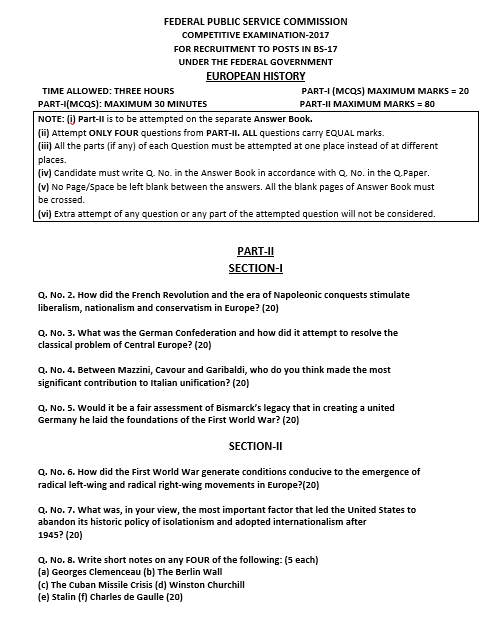Table of Contents
ToggleEuropean History 2017
SECTION-I
No. 2. How did the French Revolution and the era of Napoleonic conquests stimulate liberalism, nationalism and conservatism in Europe? (20)
No. 3. What was the German Confederation and how did it attempt to resolve the classical problem of Central Europe? (20)
No. 4. Between Mazzini, Cavour, and Garibaldi, who do you think made the most significant contribution to Italian unification? (20)
No. 5. Would it be a fair assessment of Bismarck’s legacy that in creating a united Germany he laid the foundations of the First World War? (20)
SECTION-II
No. 6. How did the First World War generate conditions conducive to the emergence of radical left-wing and radical right-wing movements in Europe? (20)
No. 7. What was, in your view, the most important factor that led the United States to abandon its historic policy of isolationism and adopt internationalism after 1945? (20)
No. 8. Write short notes on any FOUR of the following: (5 each)
- Georges Clemenceau
- The Berlin Wall
- The Cuban Missile Crisis
- Winston Churchill
- Stalin
- Charles de Gaulle
Summaries of questions:
No. 2: How did the French Revolution and the era of Napoleonic conquests stimulate liberalism, nationalism, and conservatism in Europe?
The French Revolution and Napoleon’s conquests spread the ideas of liberty, equality, and fraternity across Europe, sparking the growth of liberalism and nationalism. The revolution inspired demands for democratic reforms, while Napoleon’s military campaigns helped unify many regions. However, these events also led to a conservative backlash as monarchies and traditional elites sought to preserve their power against these new ideologies.
No. 3: What was the German Confederation and how did it attempt to resolve the classical problem of Central Europe?
The German Confederation was a loose association of 39 German-speaking states created after the Napoleonic Wars to promote unity and stability in Central Europe. It aimed to resolve the issue of German fragmentation by fostering cooperation among its members, though it struggled with internal divisions and lacked strong central authority, limiting its effectiveness in achieving true unity.
No. 4: Between Mazzini, Cavour, and Garibaldi, who do you think made the most significant contribution to Italian unification?
Each leader played a crucial role in Italian unification, but Cavour, as the prime minister of Piedmont-Sardinia, is often seen as having the most significant contribution. His diplomatic skill in forming alliances, particularly with France, and his efforts to modernize the economy laid the foundation for unification. Garibaldi’s military campaigns and Mazzini’s inspirational ideas were also vital, but Cavour’s political strategies were key to the success of the movement.
No. 5: Would it be a fair assessment of Bismarck’s legacy that in creating a united Germany he laid the foundations of the First World War?
Bismarck’s unification of Germany through a series of wars and diplomatic maneuvers did strengthen the nation but also contributed to tensions in Europe. His policies of maintaining peace through alliances were later abandoned by Kaiser Wilhelm II, which led to the breakdown of European stability. While Bismarck himself aimed to avoid war, his legacy of a unified, powerful Germany did set the stage for future conflicts, including World War I.
No. 6: How did the First World War generate conditions conducive to the emergence of radical left-wing and radical right-wing movements in Europe?
World War I caused widespread devastation, economic hardship, and political instability in Europe. The social and economic chaos created by the war made people more receptive to radical ideologies. On the left, the Bolshevik Revolution inspired socialist and communist movements, while on the right, fascist groups emerged, offering strong leadership and nationalistic solutions to the crisis. Both movements gained traction in countries struggling with post-war reconstruction.
No. 7: What was, in your view, the most important factor that led the United States to abandon its historic policy of isolationism and adopt internationalism after 1945?
The most important factor in the United States abandoning isolationism after World War II was the rise of the Soviet Union as a global superpower. The U.S. recognized the need to engage in international affairs to contain communism and ensure global stability. This led to the formation of key institutions like the United Nations, NATO, and the Bretton Woods system, marking a shift toward internationalism in U.S. foreign policy.
No. 8: Write short notes on any FOUR of the following: (5 each)
- Georges Clemenceau: Georges Clemenceau was the French Prime Minister during World War I. Known as “The Tiger,” he was a staunch advocate for a tough peace settlement with Germany after the war and played a key role in the Treaty of Versailles.
- The Berlin Wall: The Berlin Wall was erected in 1961 to separate East and West Berlin during the Cold War. It became a symbol of the division between the communist East and the capitalist West. It was dismantled in 1989, marking the end of the Cold War.
- The Cuban Missile Crisis: The Cuban Missile Crisis occurred in 1962 when the Soviet Union secretly placed nuclear missiles in Cuba, just 90 miles from the U.S. The U.S. responded with a naval blockade, and after tense negotiations, the Soviets withdrew the missiles, avoiding nuclear war.
- Winston Churchill: Winston Churchill was the British Prime Minister during World War II and a key figure in the Allied victory. He is remembered for his strong leadership, defiant speeches, and role in forming alliances that defeated Nazi Germany.
- Stalin: Joseph Stalin was the leader of the Soviet Union from the mid-1920s until his death in 1953. His regime was marked by totalitarian rule, the collectivization of agriculture, the Great Purge, and significant industrialization.
- Charles de Gaulle: Charles de Gaulle was a French military leader during World War II and later became President of France. He led the Free French Forces against Nazi occupation and was instrumental in founding the Fifth Republic, shaping modern French politics.
